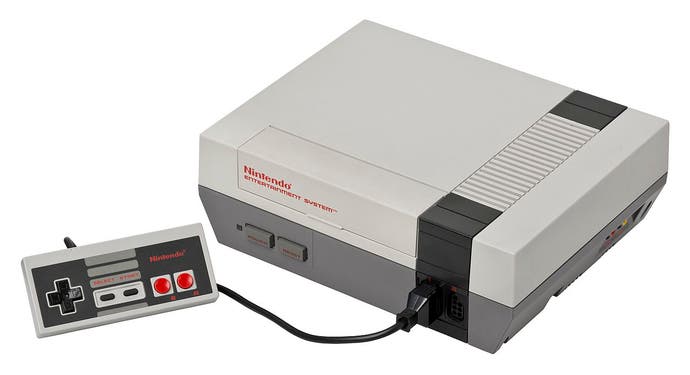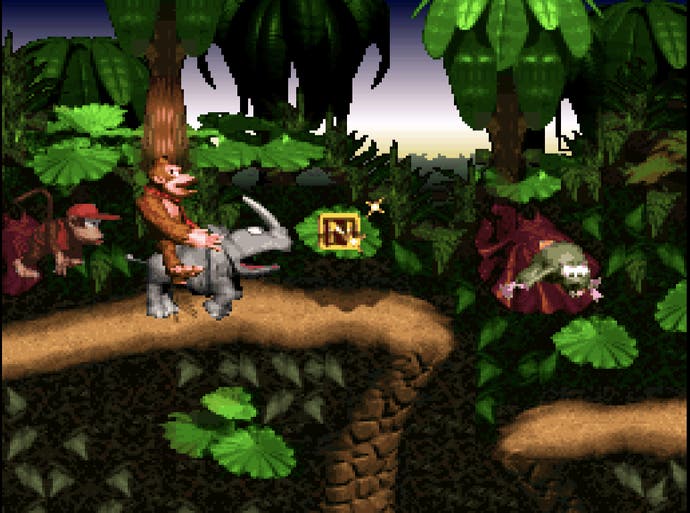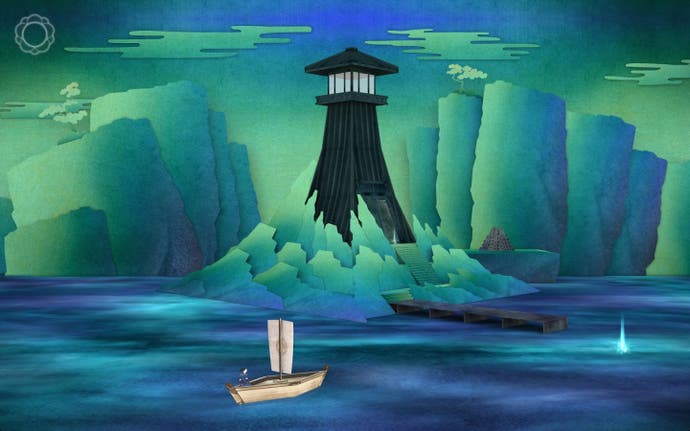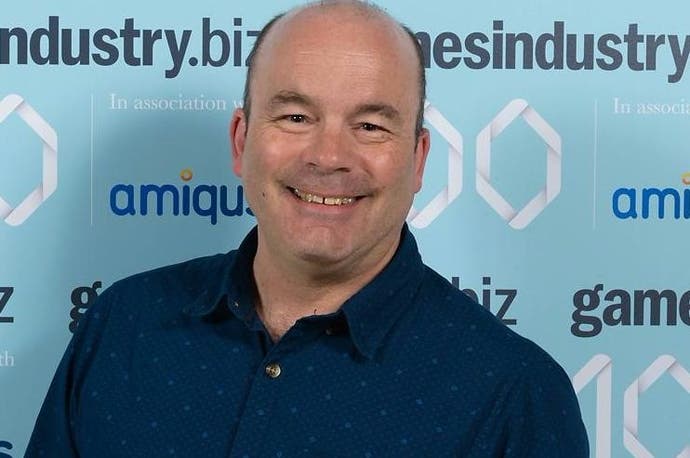From Donkey Kong to Snake Pass: the music of David Wise
The legendary composer on glorified doorbells and leaving Rare.
On the off-chance that you haven't heard of David Wise, you've almost certainly heard his music. As a third of Rare's trio of ground-breaking composers, he was responsible for the tunes behind Battletoads, Wizards & Warriors, the RC Pro-Am series and countless licensed titles for the NES and Game Boy - plus, of course, the ever-popular earworms that form the Donkey Kong Country soundtracks.
Hum just a few bars of 'Jungle Japes' wherever nostalgic gamers can be found and they'll be sure to know the tune note-for-note - not a bad legacy for a man who started out selling drums and keyboards.
"Originally I wanted to be somebody like Phil Collins, someone who goes from being a drummer to writing songs and preferably being quite well known for it," he recalls. "On the way to that pursuit, I was working in a music shop. Two guys came in one day - [Rare founders] Tim and Chris Stamper - and I was demonstrating some a Yamaha CX5 music computer to them. This was the early days of MIDI, and the CX5 let you connect keyboards to computers. I'd written some of the stuff I was demonstrating, told them when they asked, Tim asked if I had an office. I thought 'yes, I've sold another one', so I took them upstairs, started getting the finance papers out - and they offered me a job."
Wise cut his teeth on 1987 winter sports game Slalom, the first title from the Stamper brothers' rebranded Rare studio and the first NES game to be developed outside Japan. As the company became more successful, the composer found himself working on more than a dozen games within a year, encompassing a mix of licensed titles like WWF Wrestlemania and Who Framed Roger Rabbit to classic Rare properties such as Cobra Triangle and the Battletoads games.

Just two years after joining Rare, Wise found himself with one, two or ("if I was very, very lucky") four weeks to compose and produce the entire soundtrack for a video game. This alone, he says, shows how far the industry has come in terms of the role music plays in the medium.
"It was a quick turnaround back then - nowadays we get much longer," he says. "It might be several years before a product is actually out, and there's normally quite a wait before things are done because their complexities are a lot more intricate. People also expect a lot more from games. It's a different system really - games are a lot more technically advanced, and we feel obliged to push the limits."
Of course, pushing limits is something Wise rapidly became accustomed to during the NES era. The comparatively minuscule amount of memory and the primitive nature of the hardware made creating catchy tunes to complement the gameplay a major challenge.
"The NES was very much a glorified doorbell," he recalls. "Three channels for music and a noise channel that wasn't particularly glorious. The job became about making things sound as nice as possible with the limited hardware we had - which is very difficult when you only have plinky, plonky sounds.
"It was very hard. There was a lot of planning involved, trying to work out what we needed to do to make the best use of a tune. With such limited resources, you had to very carefully choose how you were going to represent something. Then again, in some ways it was easier because you knew it would all be done quickly. But I do prefer the freedom and the nice sounds we have to play with today. It's very empowering compared to that glorified doorbell."

Wise is by no means exaggerating when he describes the NES hardware this way - the soundchip was actually used in doorbells. And as avidly as the composer embraced the challenge of working within such limits, he was relieved when Rare finally moved onto the the Super Nintendo.
"The SNES by comparison was like being given an orchestra," he says. "It was still limited - we had to get every single sample into 64k of memory, which is tiny so that was a challenge, but it sounded a million times better. That artistic freedom, thinking about how we could make things sound, was very exciting. It was like being given a whole new toy to play with - and then some. We were eager to see what we could get out of that chip. "I always like a challenge, I always like to stretch myself - just like the graphics people did at Rare. We'd always try to push technology as much as possible. It was a really exciting time, working on the SNES."
That's not to say the SNES era wasn't without its hardships. While the console offered audio teams eight monophonic channels to play with, these channels had to handle every sound effect and piece of music in the game. And while MIDI was becoming more widespread, allowing composers to automate things through their computer, Wise preferred to code his creations manually as it took up less memory.
It was during this time that Wise went on to compose what is arguably the most iconic score of his career: Donkey Kong Country. Just a few seconds from the game's introduction, the jungle groove, the water level or any other piece from this soundtrack can transport millions of people back to the early '90s, no doubt squatting in front of the TV with a sibling or friend as they tackled this timeless platforming masterpiece.
When asked about the origin of this fondly-remembered musical milestone or his inspirations when composing it - basically, demanding the secret sauce that led to such unforgettable tunes - Wise is oddly humble.
"There are certain clichés, certain things we expect when we hear music," he says. "It goes back to early films, and probably even before that with ballet and things like that. There are certain feelings that certain types of instruments or music evoke. We listened to a whole lot of stuff to get the inspiration, and I suppose it's a very traditional composition where we took inspiration from many sources and putting it all together.
"Back then, even if the gameplay was good, the tune had to do a lot of the scoring underneath to tell you if things are happy, sad, jolly, or that we're in a jungle or underwater perhaps."
The work Wise did with fellow Rare composer Robin Beanland on the Donkey Kong Series has been updated and modernised throughout the previous console generations, from Donkey Kong 64 to the series revival in Donkey Kong Country Returns - a title that earned a lot of Wise's respect.
"They used a lot of the original score, but also used it as a basis for the newer tunes, which they wrote in the style of DKC and it was great," he says. "A lot of it was remixes, and I find remixing my own work very hard so it was lovely to hear how they reinterpreted that score for the Wii. It was very nice to listen to, I think they did a great job."

While content to see his previous work in such capable hands, Wise couldn't resist the opportunity to get back to grips with it in Donkey Kong Country Returns: Tropical Freeze, 15 years later. "It was different because it wasn't just doing the same thing again," he recalls. "It was taking the format, knowing that it worked and doing something slightly different with it. "Probably one of the reasons why the first Donkey Kong Country did so well was because the people who worked on it loved doing so. So being given the chance to work on a new DKC was like coming home. It was a great treat. I was very pleased to be working on it again, and this time I wasn't limited to the Super NES hardware. I was very much open to be able to use a lot of the sounds I have at my disposal now. That helped me put a different slant on it."
By the N64 era, the breakneck pace of scoring video games had slowed significantly for Wise - in part because he was sharing composing duties at Rare with Beanland and Goldeneye composer Grant Kirkhope. Wise went from producing music for multiple titles per year to one every two or three years. His portfolio gradually shifted from the studio's flagship console titles to its handheld oddities, such as It's Mr Pants for Game Boy Advance and the DS version of Viva Pinata. But, he reveals, there was a lot more happening behind the scenes.
"While we were at Rare, we had lots of titles we were working on then - many of which never saw the light of day. As with any development studio, sometimes you develop things that simply aren't applicable. It was luck of the draw whether things were actually coming out or not, so in between those times if someone gave me a handheld project to do, it was nice just to say I'd done something and the game had actually come out. A lot of the time I was working on Xbox titles, but the nature of the business means some of those didn't get to see the light of day - they're still locked in a closet somewhere."
Eventually, Wise decided to leave Rare, the studio where he had made his name, and seek fresh challenges as a freelance composer - a freedom that he still enjoys to this day. There were several reasons behind his departure, but the surplus of musical maestros at the Twycross developer was perhaps the most pressing factor.
"The reality was we had just too many composers for the titles we were producing," Wise says. "When you go from developing multiple titles to perhaps just one big project, you don't need composers fighting for the work. It seemed to be a very convenient point to leave - and I'd been working there for such a long time, I wanted a bit of time off. It was a good time to leave Rare then and go on to do new things."
Since then, Wise has scored a number of unusual titles, ranging from papercraft-styled indie title Tengami (pictured below) to mobile choose-your-own-adventure Sorcery! - plus, the aforementioned Donkey Kong: Tropical Freeze. Deciding which projects to work on often comes down to recapturing the feel of working on his early NES and SNES titles, says Wise, and shifting away from the world he had found himself in at a Microsoft-owned Rare.
"I loved working on Nintendo titles," he says when asked about his career highlight. "I feel very privileged to have worked with such a great developer of video games. It's very inspiring, so for me that's a huge highlight.
"When I'm choosing a new project, I have to like the developer - but then there are very few people in the games industry that aren't fun to work with. It's more about the title, and whether it looks fun to play. I've always gone for projects that are a bit quirky, a bit Nintendo-esque, they're the ones I like to work with. Fun, cute graphics, the sort of games where if I saw them, I'd want to pick up the controller and start playing. I'd rather work on titles that give me a big grin."

Which brings us to his latest project: Sumo Digital's Snake Pass. Originally a prototype developed during the studio's internal game jam, the physics-based platformer has taken just over a year to arrive on multiple platforms - including the Nintendo Switch. It's a project Wise is delighted to have been part of. "Sumo originally reached out to me some time ago," he says. "The game's main developer, Seb [Liese], had always been a big fan of Donkey Kong and always wanted to work with me. I saw the game and I thought it was a good fit.
"I always prefer to play the game first. That's always a good way to get a feel for the tempo. You'll also probably receive a lot of input from the development team about the direction they think it ought to go. Of course, they've probably brought you on board because they like your direction as well, so you need to bring your own style to it - which we, as composers, can't help but do anyway."
When it came to scoring Snake Pass, Wise put the focus not on the serpent's slithering movements and but the vibrant environments players find themselves traversing. The Aztec-style ruins and overall South American tones not only inspired the music itself but also the instruments used to perform it.
"What with it being a snake in a very tropical, Amazonian area, everything's very woody," Wise explains. "There's lots of bamboo in the game so we've got lots of bamboo marimbas, bamboo shakers, poles, bamboo percussion - a lot of it is based on organic-like sounds. We've also got guitars as well which can sound very South American."
Wise has also been working on '90s-style platformer Yooka-Laylee - out later this month - along with his fellow Rare alumni Grant Kirkhope, and is already looking at potential future projects. Despite writing video game music for over 30 years, the composer shows no signs of winding down, no waning enthusiasm for the industry. If anything, his ambitions are growing.
"Musically, working with a little more orchestral integration would be lovely, given the choice - but obviously it's a very expensive luxury," he says when asked about his professional bucket list. "I'd love to spend time exploring new sounds as well. These days there are so many people developing new sounds that it'd be nice to take those and do new stuff with them or explore where those sounds can go.
"There is so much stuff I want to try, and I'm not sure I'm going to get it all done in this lifetime. I could do with another four or five to do all the things I already want to do in this one. I'm proud of writing many of my pieces but I'm always looking forward to bettering them with each new piece I write or each game I work on. I'd like to think I haven't written my best stuff yet."
Want to meet Wise in the flesh? He's booked to present his Snake Pass music at the Leeds International Festival Orchestra - Videogames Music event on 25th April.





